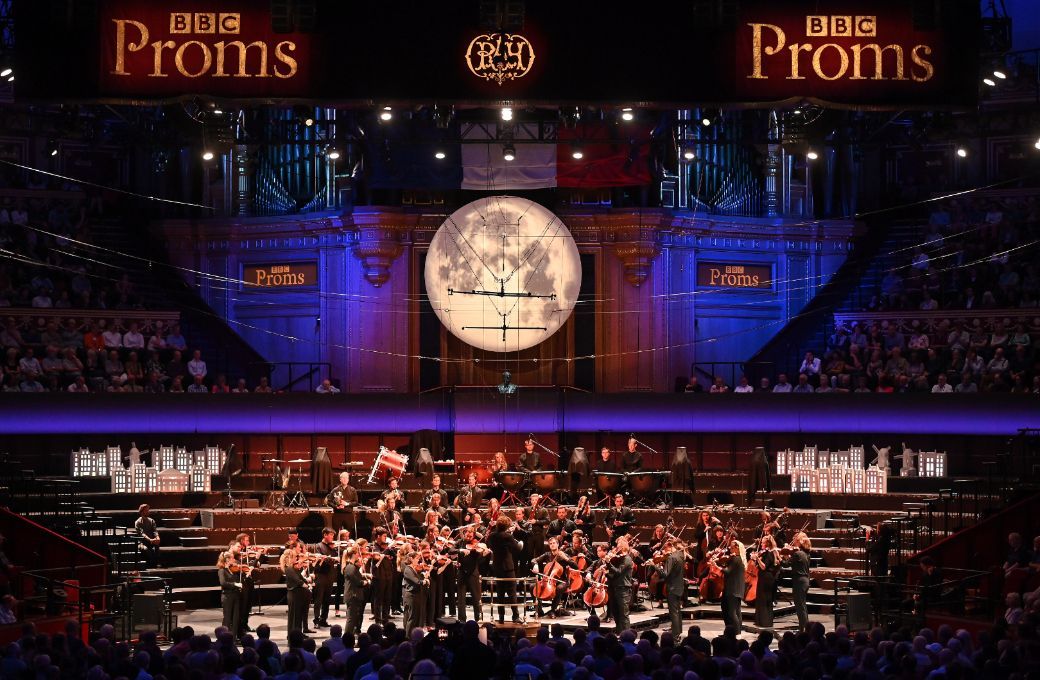There can be few better places to experience the unique intensity offered by orchestral music than the BBC Proms. For many listeners more used to amplified live music, it is a rare thrill to hear the massed ranks of acoustic instruments, one that cannot be easily captured by recordings. This preview covers the second half of this year’s BBC Proms, which stretches from 18th July to 13th September.

Dmitri Shostakovich was intimately familiar with this power of the orchestra and its ability to make public statements. This year, the Proms presents many major works by Shostakovich, marking 50 years since the composer’s death in 1975. Many things have changed in the interim, but the power of his music to connect to its publics has not.
As well as the composer’s famous Festive Overture included in the Last Night of the Proms, on 16th and 17th August Aurora Orchestra makes a return to the Proms to perform one of their magical feats – performing a huge work from memory. In this case, it is Shostakovich’s Fifth Symphony, one of the composer’s most acclaimed works during his lifetime. The previous day, the BBC National Orchestra of Wales performs the Thirteenth Symphony, a highly personal and deeply felt work, setting poetry of Yevgeny Yevtushenko.
The Thirteenth Symphony was among many of Shostakovich’s works that faced official criticism – another was his opera Lady Macbeth of Mtsensk, which led to a campaign against the composer in the pages of Pravda. On 1st September, John Storgårds leads a semi-staged performance of this scandalous opera with a standout cast, including Amanda Majeski and Nicky Spence, with the BBC Philharmonic and Orchestra and Chorus of English National Opera.
Shostakovich’s fond relationship with the cello, and with Mstislav Rostropovich, is also celebrated this year with the appearance of fiery young cellist Anastasia Kobekina, who performs the composer’s First Cello Concerto on 10th September with the BBC Scottish Symphony Orchestra and Delyana Lazarova.
Sir Simon Rattle also makes a return appearance at this year’s Proms, to conduct Shostakovich’s Tenth Symphony with Chineke! Orchestra on 5th September. One of the composer’s most tragic and desperate pieces, it’s paired with George Walker’s last, Fifth Sinfonia “Visions”, itself a tragic piece inspired by the 2015 white supremacist shootings at Emanuel African Methodist Episcopal Church in Charleston, South Carolina.
Rattle also conducts the London Symphony Orchestra’s winds and brass in a decidedly less tragic outing, including Gunther Schuller’s lighthearted trombone concerto Eine Kleine Posaunenmusik with soloist Peter Moore, as well as a selection of dances by Arnold, Grainger, Tippett and Vaughan Williams.
Musical anglophiles should also pay a visit to Vaughan Williams’ London Symphony with the Royal Philharmonic Orchestra and Vasily Petrenko on 7th September, a piece most appropriate to the handsomely ornamented Royal Albert Hall. There is also a rare chance to hear Sir Mark Elder conduct English composer Frederick Delius’ A Mass of Life, the composer’s choral-orchestral settings of Nietzsche and his grandest musical project.
Several grand musical projects are presented by guest orchestras appearing at the Proms this season. On 21st August, the Danish National Symphony Orchestra, conducted by Fabio Luisi, performs Beethoven’s Ninth Symphony, alongside more recent music from Bent Sørensen and Anna Clyne. A few days later, on 23rd and 24th August, the Royal Concertgebouw Orchestra appear with their youthful chief conductor-elect Klaus Mäkelä to perform the orchestral showpieces Mahler’s Fifth Symphony and Bartók’s Concerto for Orchestra. Janine Jansen also joins to perform Prokofiev’s First Violin Concerto.
While Mäkelä has been a regular fixture at the Proms in recent years, the Vienna Philharmonic Orchestra has not appeared since 2019. This year, on 8th and 9th September, they appear with Austrian conductor Franz Welser-Möst to perform an almost-all-Austrian selection – Berg’s Lulu Suite and Bruckner’s Ninth, then Mozart’s “Prague” Symphony capped with (non-Austrian) Tchaikovsky’s “Pathétique” Symphony.
Leipzig Gewandhaus Orchestra have likewise not appeared at the Proms since 2019. This year they appear on 26th August with music director Andris Nelsons and violin superstar Hilary Hahn, performing Dvořák’s Violin Concerto, alongside music by Arvo Pärt and Sibelius’ Second. Violin fans will also want to catch Joshua Bell, who appears on 22nd August, performing the UK premiere of Ukrainian composer Thomas de Hartmann’s Violin Concerto, alongside Gorecki’s emotive Symphony of Sorrowful Songs and Respighi’s orchestral arrangements of Bach.
Indeed, the Leipzig Cantor does have some representation at this year’s Proms. Sir András Schiff makes a return to the Royal Albert Hall, together with fellow pianist Schaghajegh Nosrati, to perform the composer’s most mysterious work, The Art of Fugue, on 23rd August. Pekka Kuusisto and the Norwegian Chamber Orchestra also perform Bach on 31st August in a distinctly modernist context, combined with Shostakovich and more recent music by Hannah Kendall and Caroline Shaw.
Modern responses to Early music are also a hallmark of the BBC Scottish Symphony Orchestra and Ilan Volkov’s appearance on 11th September, in the final week of the season, which includes music of remarkable Venetian Baroque composer Giovanni Gabrieli, together with a rare outing of Stravinsky’s final work, the haunting Requiem Canticles.
It is a season with much else besides, with a variety of concerts outside London, including in Bristol and Bradford, 2025’s UK City of Culture.
The BBC Proms begins on 18th July and continues until 13th September.
See the official BBC Proms website here.
This article was sponsored by BBC Proms.


